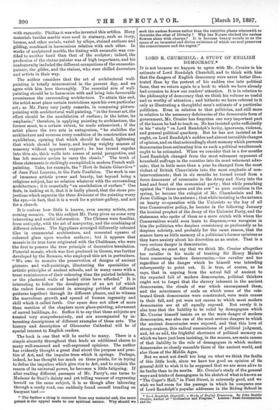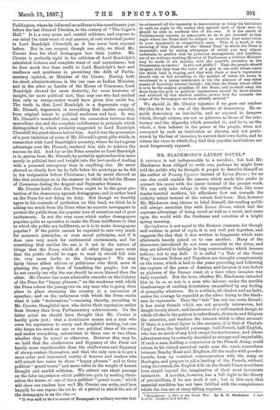LORD R. CHURCHILL: A STUDY OF ENGLISH DEMOCRACY.* Jr is
not because we happen to agree with Mr. Crozier in his estimate of Lord Randolph Churchill, and to think with him that the dangers of English democracy were never better illus- trated than by the portent of his sadden rise into political fame, that we return again to a book to which we have already had occasion to draw our readers' attention. It is in relation to
the philosophy of democracy that we think his volume so useful and so worthy of attention ; and hitherto we have referred to it only as illustrating a thoughtful man's estimate of a particular politician. Even in relation to that politician, and still more in relation to the necessary deficiencies of the democratic form of government, Mr. Crozier has forgotten one very important part of the lesson he had to teach us. He has insisted quite sufficiently in his " study " on Lord Randolph's levity, ignorance, violence, and general political quackery. But he has not insisted as he ought, on Lord Randolph's sudden and almost incredible changes of opinion, and on that astoundingly short memory which prevents democracies from estimating him as such a political weathercock ought to be estimated. When we consider that in a few months Lord Randolph changed from the most vehement opponent of household suffrage in the counties into its most vehement advo- cate; that in little more than a year he changed from the most violent of British Chauvinists into the most emphatic of non- interventionists; that in six months he turned round from a fierce denouncer of economies in the Army and Navy into the head and front of the economical party ; that while preaching against the "three acres and the cow" as pure socialism in the spring, he became the eulogist of Mr. Chamberlain and Mr. Jesse Collings in the autumn ; that while insisting in the autumn on hearty co-operation with the Unionists as the key of all true Conservative policy, he became in the following January the ironical prophet of the decay of the Unionist Party, and the statesman who spoke of them as a mere crutch with whom the Conservatives would soon learn to dispense,—we recognise in him the politician who despises consistency as profoundly as he despises sobriety, and probably for the same reason, that the masses have as little memory of a politician's former opinions as they have anxiety about his discretion as an orator. That is a very serious danger in democracies.
Farther, we mast say that we think Mr. Crozier altogether
too cavalier in his mode of treating Sir Henry Maine's fears concerning modern democracies,—too cavalier and too regardless of the danger which he himself was intending subsequently to point out. It is true, of course, as he says, that in arguing frost the actual fall of ancient to the expected fall of modern democracies, political thinkers ought not to forget that the slavery inherent in the ancient democracies, the clouds of war which encompassed them, and the minuteness of scale on which some of the cele- brated Greek democracies were constructed, were main causes in their fall, and yet were not causes to which most modern democracies are at all equally exposed. But surely it is also true that the liability to be ruled by demagogues which Mr. Crozier himself insists on as the main danger of modern democracies, was also one of the most serious dangers to which the ancient democracies were exposed, and that this love of stump-oratory, this radical unsoundness of political judgment, and, let us add, the frightful shortness of political memory on which we have just been insisting, in the masses, are main causes of that liability to the role of demagogues in which modern democracies so closely resemble those of the ancient world, and also those of the Middle Ages.
But we must not dwell too long on what we think the faults
of this little book, since we have too good an opinion of its general drift to wish it to be supposed that we are more alive to its faults than to its merits. Mr. Crozier's study of the general ways and tricks of demagogues in his sketch of what is known as "The Coger's Hall," in Fleet Street, is extremely good, and we wish we had room for the passage in which he compares one of Lord Randolph's popular addresses in the Riding School in • Lord Randolph Churchill; a Study of English Democracy. By John Beattie Crosier, Author of "Oi,Ilisatioa and Progress." London: Swan Sonnensohein and Co.
Paddington, where he delivered an address tohis constituents just before the last General Election, to the oratory of "The Coger's Hall." It is a very acute and careful criticism, and exposes to our mind the utter want of real passion, of real oratorical power in Lord Randolph Churchill, as it has never been exposed before. But in one respect, though one only, we think Mr. Crozier does his ideal demagogue less than justice. Mr. Crozier is perfectly right in his criticism of Lord Randolph's calculated violence and complete want of real earnestness ; but he does much less than credit to Lord Randolph's tact and readiness and quickness in perceiving the drift of Parlia- mentary opinion, as Minister of the Crown. During both his short administrations, in the one case as Indian Minister, and in the other as Leader of the House of Commons, Lord Randolph showed far more dexterity, far more keenness of insight, far more political tact, than any one who had studied him only as stump-orator would have given him credit for. The truth is, that Lord Randolph is a degenerate copy of Mr. Disraeli, degenerate in everything that implies capacity, from original talent to political readiness and tact. It was Mr. Disraeli's wonderful rise, and the connection between that marvellous rise and the complete indifference to principle which distinguished it, which probably suggested to Lord Randolph Churchill the great chance before him. And it was the possession of a poor imitation of some of Mr. Disraeli's great gifts which, in connection with Lord Randolph's ancestry, where he had a great advantage over Mr. Disraeli, rendered him able to achieve the success be did. And far as the Poles asunder as Lord Randolph is in genius from Mr. Disraeli, he probably approaches him more nearly in political tact and insight into the best mode of dealing with a personal emergency than in anything else. He never showed so clearly how far he falls below his prototype as he did in his resignation before Christmas ; but he never showed so like that prototype as in the manner in which he led the House of Commons during the August and September Session.
Mr. Crozier holds that the Press ought to be the great pro- tection of the democracy against demagogues, and is rather hard on the Press for not doing its duty. But though we heartily agree in his counsels of perfection on this head, we think he is asking too much from the Press when he expects newspapers to protect the public from the popular love of sensation and of poor excitements. Is not the very cause which makes demagogues popular, quite as operative to make the Press indifferent to that to which the public are indifferent, as it is to make demagogues popular ? If the public cannot be expected to care very much for economic principles, or even moral principles, and if it does care very much for sentimental excitements, and for something that catches the ear, is it not in the nature of things that the Press, which of all other things cares most that the public should be eager to read it, should fall into the very same faults as the demagogues ? We may fairly blame either editors or politicians who think more of pleasing the people than of benefiting the people ; but we do not exactly see why the one should be more blamed than the other. Mr. Crozier has some admirable remarks on the idolatry of the Press for "happy phrases ;" on the weakness with which the Press echoes the panegyrics on any man who is going from place to place stumping the country in a succession of speeches; and on the unfairness with which the Press snubs what it calls "doctrinaires,"—meaning thereby, according to Mr. Crozier, thoughtful men who derive their reputation rather from literary than from Parliamentary achievements. On the latter point we should have thought that Mr. Crozier is hardly quite just ; that a doctrinaire means not a man who owes his reputation to study and thoughtful writing, but one who harps too much on one or two political ideas of his own, and makes everything subservient to those one or two ideas, whether they be sound or otherwise. However this may be, we hold that the shallowness and flippancy of the Press are hardly more reprehensible than the shallowness and flippancy of stump.orators themselves, and that the only cure is to get a more sober and instructed society of hearers and readers who will attach less value to these "happy phrases" and to these political "grand tours," and more value to the weight of honest thought and candid criticism. We extract one short passage on the false importance which politicians gain by making them- selves the heroes of one of time political "grand tours," which will show our readers how weil Mr. Crozier can write, and how happily he can expose the tricks of a period in which the art of the demagogue is on the rise :— " It MA said to be tie secret of Stionaparths military success that he exhausted all his ingenuity in manmnvring to bring his battalione at snob an angle to the enemy that against each of their men ho should be able to confront two of his own. It is the secret of Parliamentary success, to manceuvre so as to get yourself at that angle where the Press shall be obliged to mention your name twice to your opponent's or competitor's once. This, in a word, is the meaning of that illusion of the 'Grand Tour' in which the Press is immersed ; and by taking advantage of which you may almost undertake to predict that by judicious management and handling, out of an ordinary working Member of Parliament a Cabinet Minister may be made in six months, with the possible reversion to the Premiership in twelve ! Is this not pitiful ? That the people shock) imagine that they bear the voice of a god in one with whose name the whole land is ringing, and that with them a man's reputation should rise or fall according to the number of times his name is mentioned in a penny newspaper, is (in the absence of any other means of knowing) natural enough ; but that the Press, whose office it is to be the zealous guardian of the State, and to smelt away the dross from the gold in political reputations, should be brow-beaten and subdued by this shallow artifice, proves how far towards the reign of the Demagogue we have already arrived."
We should do Mr. Crozier injustice if we gave our readers. the idea that he is one of the decriers of democracy. He re- gards democracy as inevitable, and as exposed to dangers which, though serious, are not so grievous as those of the aris- tocracy and the oligarchy which preceded it ; and he is, on the whole, a firm believer in the power of the people, when not corrupted by such an institution as slavery, and not panic- struck by the fear of invasion, to correct their own faults, and to reform the vices to which they find that popular institutions are most dangerously exposed.



































 Previous page
Previous page